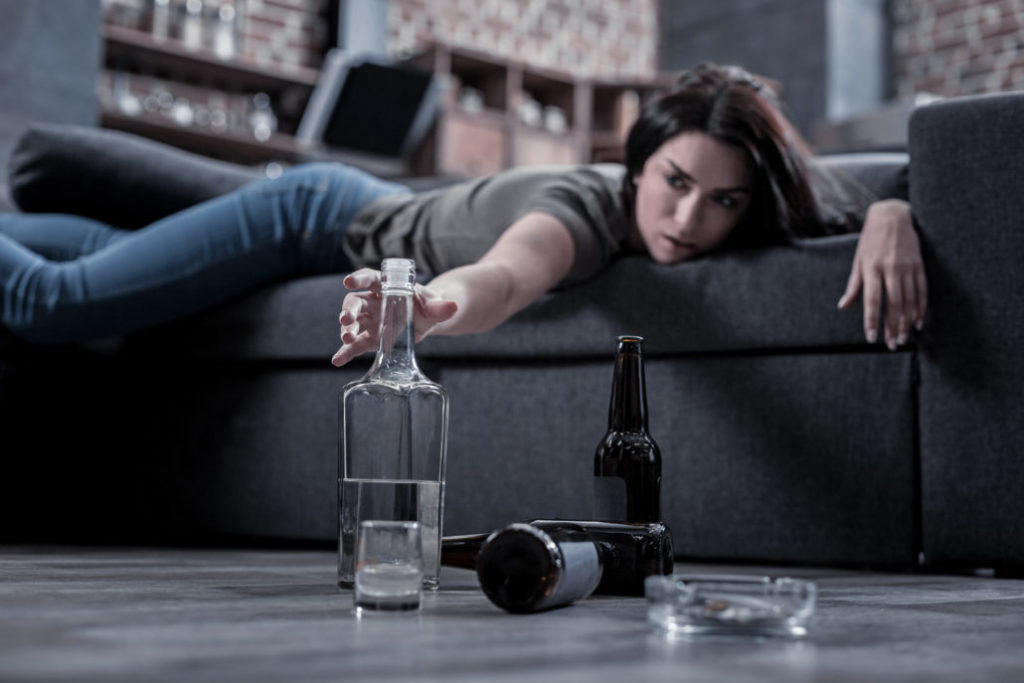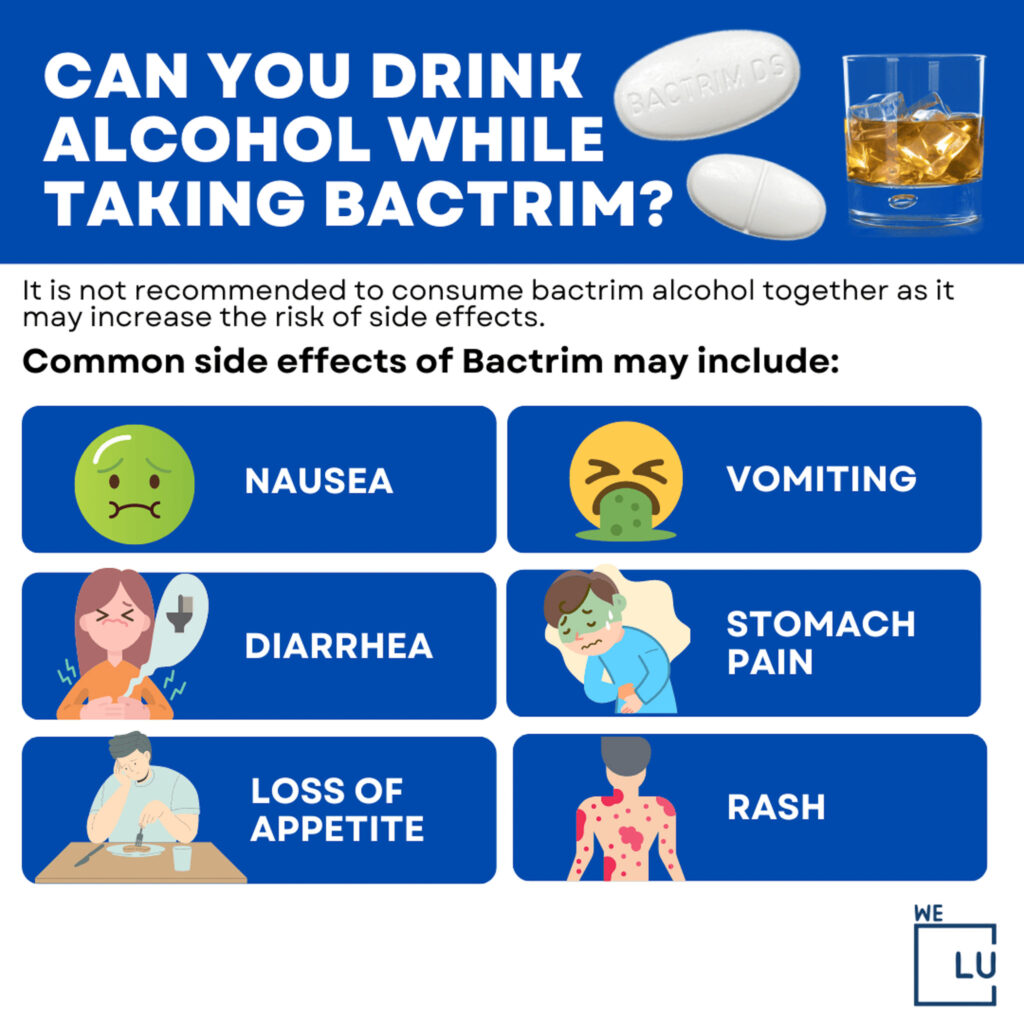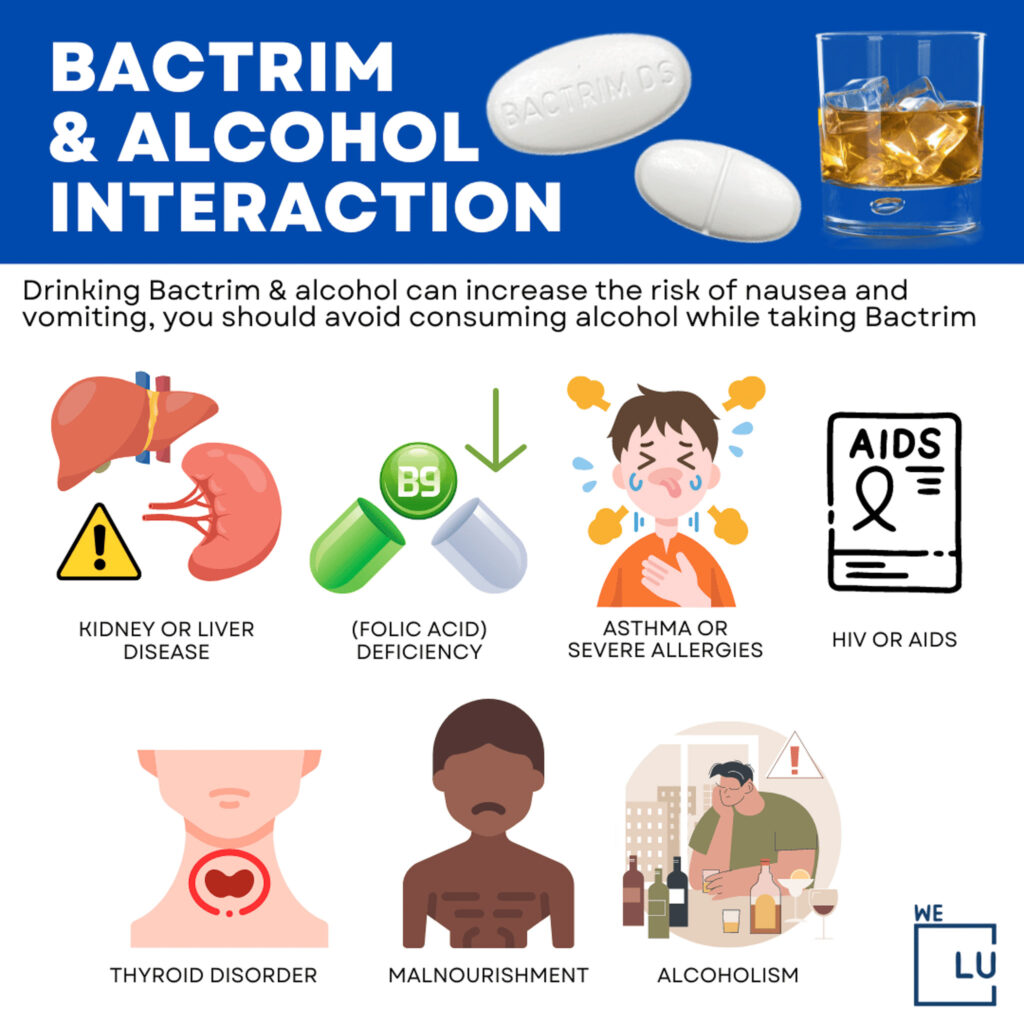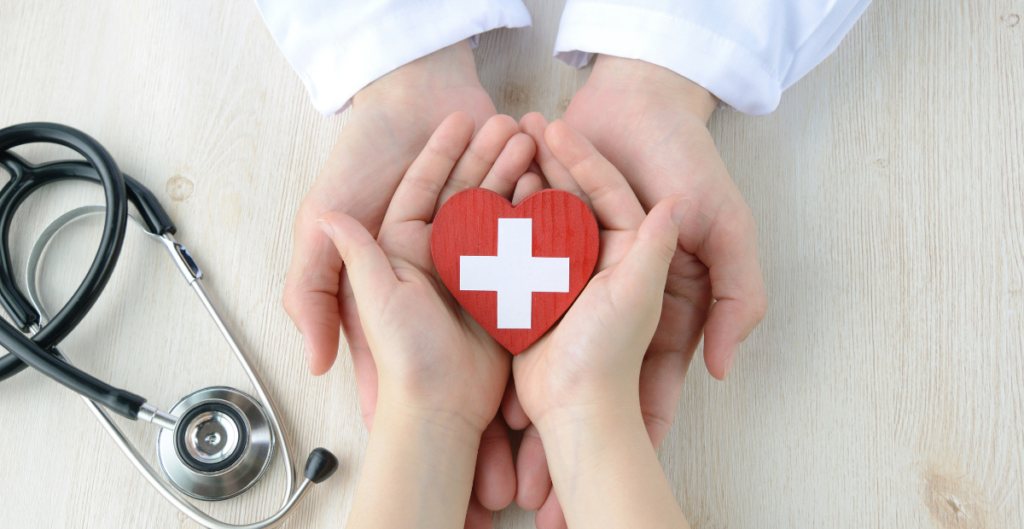What Is Bactrim?
Bactrim is used to treat certain bacterial infections, such as pneumonia (a lung infection), bronchitis (infection of the tubes leading to the lungs), and infections of the urinary tract, ears, and intestines. It also is used to treat ‘travelers’ diarrhea. Co-trimoxazole sold under the brand name Bactrim is a combination of trimethoprim and sulfamethoxazole and is in a class of medications called sulfonamides. It works by stopping the growth of bacteria. Antibiotics will not kill viruses that can cause colds, flu, or other viral infections. [1]
Co-trimoxazole or Bactrim may cause side effects. Mixing prescription drugs with alcohol such as the combination of Bactrim and alcohol can increase these side effects. A few antibiotics — such as metronidazole (Flagyl), tinidazole (Tindamax), and sulfamethoxazole and trimethoprim (Bactrim) — should not be mixed with alcohol because this may result in a more severe reaction. Tell your doctor if any of these symptoms are severe or do not go away:

- Nausea
- Vomiting
- Loss of appetite
If you experience any of the following symptoms, call your doctor immediately:
- Rash
- Itching
- Sore throat
- Fever or chills
- Severe diarrhea (watery or bloody stools) that may occur with or without fever and stomach cramps (may occur up to 2 months or more after your treatment)
- Shortness of breath
- Cough
- Unusual bruising or bleeding
- Yellowing of the skin or eyes
- Paleness
- Red or purple skin discolorations
- Joint or muscle pain
Bactrim And Alcohol Reaction
You’ve probably seen this warning on medicines you’ve taken. The danger is real. Mixing alcohol with certain medications such as Bactrim or any other antibiotics can cause nausea and vomiting, headaches, drowsiness, fainting, or loss of coordination. It also can put you at risk for internal bleeding, heart problems, and difficulties in breathing. In addition to these dangers, alcohol abuse can make a medication less effective or even useless, or it may make the medication harmful or toxic to your body.
Some medicines that you might never have suspected can react with alcohol, including many medications which can be purchased “over-the-counter”—that is, without a prescription. Even some herbal remedies can have harmful effects when combined with alcohol.
Side Effects Of Mixing Bactrim and Alcohol
Many antibiotics carry caution stickers that warn against alcohol consumption. Data regarding concurrent use are sparse. An awareness of data that addresses this common clinical scenario is important so health care professionals can make informed clinical decisions and address questions in an evidence-based manner. “Can I drink alcohol with my antibiotic?” is a frequent query to health care professionals. Many prescription bottles come labeled with a sticker that warns against alcohol use with the antimicrobial.
How Alcohol Impacts Infections And Healing
Physicians have recognized for more than a century that alcohol use is associated with infections and that alcoholics are especially at risk for pneumonia. Clear evidence now indicates that alcohol has a systemic effect on every organ.
Alcohol use disorder and misuse have been part of human society for centuries. Early physicians recognized in the 1800s that alcohol produced not only impairment of the senses but also a higher predisposition for tuberculosis. William Osler, the father of scientific medicine, reported in 1905 that patients who misused alcohol had a higher predisposition to pneumonia.

Between 2006 and 2010 in the United States, excessive alcohol consumption resulted in approximately 88,000 deaths (data based on 11 U.S. States), and the median alcohol-attributable death rate was 28.5 per 100,000 population. Furthermore, the potential years of life lost attributed to alcohol (estimate of the average years people would have lived if they had not died prematurely) averaged 2.5 million years annually from 2006 through 2010. Importantly, the majority of alcohol-related deaths and potential life lost were among working-age adults (20- to 64-year-olds).
In addition, the estimated cost of excessive drinking was $223.5 billion in 2006, from which the majority represented a loss of productivity, valued at $161.3 billion, followed by increased health care costs and criminal justice costs of $21 billion each.
Like any other organ in the human body, the skin is also affected by alcohol intake. Alcoholism is associated with higher rates of wound infection and delay in wound closure. It is associated with an increased risk for Staphylococcus aureus infection, including methicillin-resistant Staphylococcus aureus, Streptococcus pyogenes, and Vibrium vulnificus. Ethanol seems to impair dermal fibroblast function, which plays a role in wound healing. Dermal fibroblasts display proliferative responses along with the secretion of growth factors. [2]
How Alcohol Interacts With Antibiotics
Alcohol might affect how well some antibiotic medications work. It’s possible that if you use Bactrim and alcohol together, antibiotics may be less effective at clearing up the infection that you are being treated for. The research on mixing alcohol with antibiotics is somewhat limited and unclear, but the combination has been associated with symptoms such as tachycardia (rapid heartbeat), sudden changes in blood pressure, gastrointestinal upset, headache, flushing, and liver damage.
Other antibiotics that should not be mixed with alcohol include:
- Amoxicillin
- Flagyl (metronidazole)
- Nizoral (ketoconazole)
- Nydrazid (isoniazid)
- Tindamax (tinidazole)
Mixing Alcohol And Bactrim Is Not Entirely Safe
Usually, drinking Bactrim and alcohol won’t keep your antibiotic from working to treat your infection. Still, it can interfere with your infection’s healing in other ways. Getting enough rest and eating a nutritious diet both help you recover from sickness or infection. Drinking alcohol can interfere with these factors.
For instance, drinking Bactrim and alcohol can disrupt your sleep patterns. It can keep you from getting a good night’s sleep. Alcohol can also stop your body from absorbing vital nutrients. It can increase your blood sugar levels and zap your energy levels. All of these factors can reduce your body’s ability to heal from an infection. Acute alcohol use, binge drinking, and chronic alcohol use can all be harmful, whether you take medication or not.
Keep in mind that alcohol isn’t just limited to beer, wine, liquor, and mixed drinks. It can be found in some mouthwashes and cold medications, too. Check the ingredient labels on these and other products if you’ve had an alcohol-antibiotic reaction in the past. Ask your doctor if it’s safe for you to use these products while you take an antibiotic. Doctors often prescribe antibiotics for a short time. In many cases, you only need to take antibiotics for a week or two to fully recover from an infection. [3]
Bactrim And Alcohol Death
Patients with a history of heavy acute or chronic alcohol use have higher rates of:
- Hospitalizations
- Longer hospital stays
- The risk for major complications when they also suffer polytrauma (like pneumonia, bleeding disorders, and withdrawal syndrome)
- Increased mortality
- Higher intensive care unit admissions, and
- Greater postoperative complications when they are admitted to hospitals and when they need surgery, compared with patients with no history of alcohol use.
This is the main reason why mixing alcohol and Bactrim or any other prescription medications is dangerous and can be lethal as alcohol can worsen your conditions.
Can You Drink Alcohol While Taking Bactrim? Infographic
Can I drink alcohol with Bactrim? As a helpful rule of thumb, you should never mix drugs. This applies to alcohol and Bactrim antibiotics. Always ask your doctor if you can drink alcohol while taking any prescribed medication. Continue to read more about the dangers of mixing alcohol and Bactrim antibiotics.

Embed the below “Can You Drink Alcohol While Taking Bactrim?” Infographic to your Website. This infographic is provided by the We Level Up addiction treatment center team. To use the below infographics, you agree to link back and attribute its source and owner at https://weleveluptx.com/bactrim-and-alcohol/
Can You Drink Alcohol While Taking Bactrim? Infographic image link: https://weleveluptx.com/wp-content/uploads/2024/01/Can-You-Drink-Alcohol-While-Taking-Bactrim-1024×1024.jpg

Embed the below “Bactrim And Alcohol Interaction” Infographic to your Website. This infographic is provided by the We Level Up addiction treatment center team. To use the below infographics, you agree to link back and attribute its source and owner at https://weleveluptx.com/bactrim-and-alcohol/
Bactrim And Alcohol Interaction Infographic image link: https://weleveluptx.com/wp-content/uploads/2024/01/Bactrim-Alcohol-Interaction-1024×1024.jpg
Prescription Drug Rehab Texas & Alcohol Treatment
Mixing Bactrim and alcohol puts you at risk for dangerous reactions. Protect yourself by avoiding alcohol if you are taking a medication and don’t know its effect. To learn more about a medicine and whether it will interact with alcohol, talk to your pharmacist or other health care provider.
Mixing any combination of prescription drugs, over-the-counter drugs, illicit drugs, and alcohol can be unpredictable and dangerous. Most fatal overdoses involve the use of more than one type of drug (poly-drug use). Mixing prescription drugs with alcohol is dangerous because different drugs act on our bodies in different ways. The harmful effects are magnified by using more than one drug type. For example, the more alcohol in the body, the less heroin needed to cause a drug overdose.

How We Can Help? Searched for “dual diagnosis treatment centers Texas & Texas inpatient consultants” or are you seeking a national inpatient rehab destination?
Treatment for alcohol and drug misuse includes medications that can help people get control without a high chance of addiction. Typically, a key part of treatment is counseling or psychotherapy. It may also require withdrawal detoxification, addiction medicine, and recovery support.
Call today to speak with one of our treatment specialists here at We Level Up TX. Our specialists know what you are going through and will answer any of your questions. Your call is private and confidential and there is never any obligation.
Sources:
[1] Co-trimoxazole – U.S. Department of Health and Human Services National Institutes of Health
[2] Alcohol Use As a Risk Factor in Infections and Healing – National Center for Biotechnology Information
[3] Combining Antibiotics and Alcohol: Is It Safe? – https://www.healthline.com/health/antibiotics-alcohol